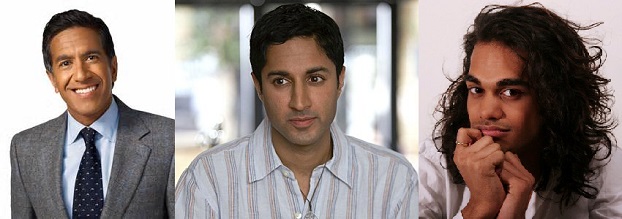To my friends with “funny” names: Don’t let them cut your name. Don’t soften your accents to appease their tongues. Don’t hide your letters and shrink to a single syllable — a single breath.
My mom thought maybe Neil would be my name, but I’m not sure what happened with that idea. I suppose Sunjay seemed like a better fit. She hoped people would nickname me Sunny and that maybe I’d have a sunny disposition. For the most part, that didn’t really happen. I’ve come to learn that I mostly hate the sun and overly cheery people, so I guess that is a bit ironic.
When you’re a kid, the last thing in the world you want is to stand out, or be different. Growing up, I was always jealous of my friends of colour who had escaped with “normal” names. Names you wouldn’t give a second thought to or even interrogate. They had a better chance of passing, with few questions asked.
Samantha could be brown or black, and that was normal. Same with Josh or Stephanie. I guess at least I didn’t have to worry about being Sunjay M. Because there was never a Sunjay A. or Sunjay C. or Sunjay H. I could always just be Sunjay.
 Every Sunday night, a new episode of The Simpsons would air. I loved the show, but always secretly prayed Apu’s brother Sanjay would not make an appearance. Sanjay was the convenience store-owning, South Asian-accented (voiced poorly by a white guy) walking stereotype. I also scanned through the syndicated episodes that would air throughout the week to ensure I wouldn’t have to face any comments or racist accents at school the next morning. School bullies are unpredictable after all, you never know what they’ll pick up.
Every Sunday night, a new episode of The Simpsons would air. I loved the show, but always secretly prayed Apu’s brother Sanjay would not make an appearance. Sanjay was the convenience store-owning, South Asian-accented (voiced poorly by a white guy) walking stereotype. I also scanned through the syndicated episodes that would air throughout the week to ensure I wouldn’t have to face any comments or racist accents at school the next morning. School bullies are unpredictable after all, you never know what they’ll pick up.
“But something inside me always made me panic whenever Sanjay did appear on screen.”
It didn’t really happen, of course, as the kids at my school were probably negotiating their own insecurities, their own culture clashes. But something inside me always made me panic whenever Sanjay did appear on screen. I’m lucky that I grew up in a place where most of us did have funny names. Maybe we had each other’s backs.
But what about other kids? And what would happen when I grew up?
Well, things like this would happen: I remember a chess tournament in Grade 6 that took place in a neighbouring, less diverse town. My opponent was from some school in this town and when he asked me my name, I said Sunjay. He then put his hands together as if he were praying and started mocking a South Asian accent and saying gibberish. My name had signified to him that it was okay and appropriate to do this.
At university parties, I got in the habit of sometimes using a fake name when introducing myself to people I was sure I would never see again. Whenever I didn’t feel like having a discussion about my name, I’d use a simple, common name that wouldn’t warrant an explanation.
“When the media gets hold of our names, it can be dangerous.”
When the media gets hold of our names, it can be dangerous. The integrity of our names is trivialized and mocked. We’re given accented, asexual geeks or assistants or best friend to the white guy. When I grew older, there was Sanjay from Weeds. Sanjaya from American Idol.

A co-worker a few years ago: “You remind me of Sanjay from Weeds! You even kind of look like him!”
A stranger: “Oh, like Sanjaya from American Idol? You know who I’m talking about? (starts laughing and singing some song)”
A high school teacher: When she takes attendance for the first time and sees my name, she talks about how much she loves Dr. Sanjay Gupta from CNN.
Random brown people will sometimes tell me I’m spelling my name “wrong”.
When auditioning for those scarce brown roles in Hollywood, Danny Pudi (Community) noticed a growing number of “Sanjay” characters. He calls 2007 the “Year of Sanjay”:
Two ‘Sanjays’ might be a coincidence. Three ‘Sanjays’ is a flat-out trend. So what caused the ‘2007 Sanjay fever’? Was it the success of American Idol sensation ‘Sanjaya’? Possibly. Well? Yes. But what concerns me more is something deeper, something sinister revealed within this data. Maybe when people look at me all they see is a ‘Sanjay’. Like a 45-year-old woman with blonde hair, a fake tan, and long fingernails who works at a salon is probably a Debbie, am I a ‘Sanjay’?
Here are some of the words used in the casting descriptions for ‘Sanjay’: “quirky”, “mild-mannered”, “placid facade”, “virginal” and “allergic to dogs”. Dangit. These words fit me. But in Sanskrit, the word ‘Sanjay’ actually means “Victorious”, or “Conqueror”. Hmmm, “Victorious Conqueror” doesn’t exactly fit me, but my wife hopes that someday it will. Regardless of the reasons for ‘Sanjay Fever’, I have learned that a name can only reveal so much. Though people might find comfort in naming me Raj, Arash or Sanjay, I know that I can be more than a ‘Quirky Virgin’; I can also be a ‘Victorious Conqueror’ (someday). (GQ)
It would be interesting to see more studies about the effects of having an “ethnic”, “ghetto” or even “suspicious” name. Muslim names are sadly still constantly under surveillance and interrogation. A soon-to-be released American documentary called Searching for Shaniqua discusses the stigma attached to black names and what it’s like having names that are often ridiculed and devalued because of stereotypes. Names can get stripped of their power. Check out all the truth in Sha’Condria “iCon” Sibley’s poem “To All the Little Black Girls with Big Names (Dedicated to Quvenzhane’ Wallis)“.
A former co-worker and friend of mine says she has used a shortened, more ambiguous version of her name on resumes to help avoid any prejudice. When I was updating my own resume, I was told to be sure I noted I was fluent in English. Because people might assume otherwise because of my name.
My name isn’t Sanjay. It never was. While there are many fictional Sanjays now, I have yet to actually meet another real Sunjay (or even a Sanjay). And I am kind of happy about that. There’s almost this sort of freedom to having this name that is spelled “wrong”, to be able to figure out what Sunjay means for me. A friend recently told me that Sunjay is a popular name in his hometown in Trinidad. I had heard of this before too. Perhaps in that town, there is a Sunjay A., a Sunjay C., and maybe another Sunjay M.
Names can oust you. Names can sometimes easily betray you — tell strangers more about you than you’d care to mention. And as much as you can’t control someone’s idea of you, sometimes your name is all they need. Sometimes it’s all they want. But to my friends with “funny” names: don’t ever be less than your name.
* * *
Sunjay Mathuria is an editor-turned-urban planning student living in Toronto, Canada.












